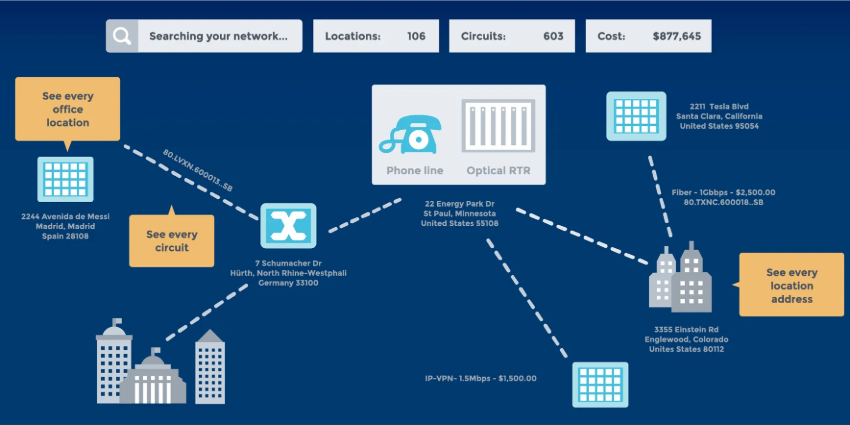Communication has evolved drastically in recent years, moving from a position where setting up any kind of conversational landscape was a huge challenge, to a flexible environment in the cloud. Thanks to the evolution of cloud-based technology, businesses can now access the next-level communication tools they need at the click of a button, with very little initial outlay to worry about, and a low TCO (Total Cost of Ownership)
Throughout 2019, the flexibility, scalability, and cost efficiency of the cloud helped the technology to see rapid adoption, particularly in areas like CCaaS and UCaaS. To get a better insight into the evolution of the cloud, and to explore where communications are heading in 2020, I spoke to BICS, a leading international communications provider. Here’s what I learned speaking to Divya Ghai Wakankar, Head of Innovation & Product Management for BICS.
How Significant has Cloud Growth Been Lately?
BICS creates solutions designed to support the modern lifestyles of businesses in need of agility, flexibility, and growth. According to Divya, the company believes that enterprises will continue to focus heavily on cloud-based solutions and services, based on the trends in 2019. “Companies are heading rapidly into the digital landscape. We work with our customers and customer base to provide them with the services that they can bundle into their solution and deliver to the market. We’ve seen a huge demand for cloud-based services lately.”
In the past, according to Wakankar, there was a heavy focus on vendor solutions that bundled software and hardware packages together. After investing in software and hardware, companies then needed to buy their connectivity separately. Now, there’s a growing trend of moving into the cloud and investing in a software-first solution with UCaaS or CCaaS providers. “These solutions provide an immediate up-and-running instance of software, together with worldwide connectivity. This leads to a huge improvement in customer experience, faster adoption and a reduced total cost of ownership.”
Is Moving to the Cloud Becoming Simpler?
Traditionally, the idea of moving communications to the cloud was a very complicated one, with many tasks to be planned, from number porting to ripping and replacing old technology. Divya told me that many enterprises are growing more comfortable with the transition today and that the migration is becoming less of a challenge. “We help customers with an E2E migration to the cloud that includes porting or buying new numbers, enabling variety of use-cases based on the business needs while taking care of the security of communication channels.”
BICS is one of the leading international communications enablers in the market today, making it easier for businesses of all sizes to create global cloud communication landscapes. “We work together with companies, understand their needs for migration to the cloud and suggest solutions adhering to the changing regulation in the communication space.”
“We offer the consultation and professional services that businesses require, forming a partnership with our clients”
Whether companies want to move to a single cloud provider or a multi-cloud solution, all they need to do is click a button to start setting things up in the cloud. With the right service support, moving into the cloud is a far more straightforward experience.
What’s Coming Next in 2020?
Wakankar believes that in 2020, Enterprises will be taking another step forward towards their digitalisation strategy. The focus is likely to be on enhancing the customer experience, improving employee work tools to increase productivity, and driving a more efficient workforce. Divya told me that she believes AI, chatbots, and other tools will be crucial in the near future, particularly when it comes to automating and enhancing workflows.
“Automation of workflows is something that I think we’ll see a lot of in 2020, as alongside a shift into the omni-channel space. Although omni-channel communication has been around for a while now, people are starting to get the hang of offering those diverse communication experiences.”
Additionally, another major trend for 2020 in Wakankar’s opinion is likely to be the rise of multi-national workforces, where companies expand their employee base across the world into new geographies. When this happens, companies want their globally dispersed employees to be using the same tools, so that they can manage everything in the same environment. “A shift from local to global communication providers will be crucial. Companies will want a single provider to manage all of their environments at once.”
Breaking Down Global Barriers
Thanks to the cloud and support from global providers like BICS, it’s becoming much easier for businesses of all sizes to expand on a global basis. All you need to do is configure an IP address, plugin your UCaaS or CCaaS solution, and you’re ready to go.
BICS offers multi-national coverage across every country that its customers are located in, without demanding a substantial initial investment, and the company has solutions for security and fraud prevention too. In 2019, BICS made some significant achievements in upgrading its offering, with APIs for ordering, porting, and configuring numbers for company workflows, as well as multi-country SIP trunking channels to reduce TCO for businesses. BICS also invested in solutions that enable enterprises to build mobile-first communications for customers.
This range of services and upgrades means that BICS is rapidly breaking down the barriers to global communications networks, for companies of all sizes.







